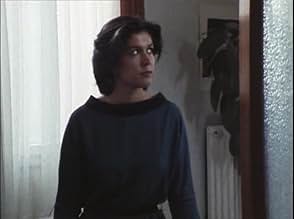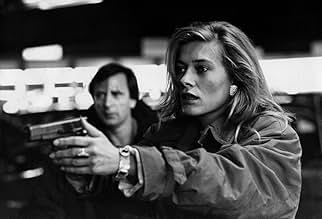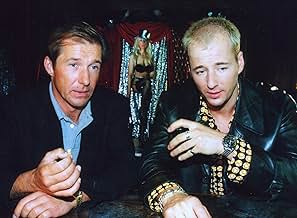"Der Fahnder" ist ohne das Revier nicht vorstellbar. Ballungszentrum für Industrie und Brieftauben, für Fußballvereine und Pommesbuden, ist es gleichzeitig aber auch sozialer Brennpunkt."Der Fahnder" ist ohne das Revier nicht vorstellbar. Ballungszentrum für Industrie und Brieftauben, für Fußballvereine und Pommesbuden, ist es gleichzeitig aber auch sozialer Brennpunkt."Der Fahnder" ist ohne das Revier nicht vorstellbar. Ballungszentrum für Industrie und Brieftauben, für Fußballvereine und Pommesbuden, ist es gleichzeitig aber auch sozialer Brennpunkt.
- Auszeichnungen
- 1 Gewinn & 2 Nominierungen insgesamt
Folgen durchsuchen
Handlung
WUSSTEST DU SCHON:
- WissenswertesPlayed in a fictional City called "Gleixen", but was shot in Munich.
- VerbindungenReferenced in Marienhof: Zwei Väter (1993)
Ausgewählte Rezension
Klaus Wennemann, who played "Faber", the main character of this serial, died January 7th of lung cancer.
"Der Fahnder" was his biggest success: He had about 40 percent of all viewers with this serial and that was quite a fantastic quote in the 80s and early 90s in Germany.
Faber is a very special character: quick-tempered and impatient, but professional. He doesn`t seem to know why he still is a cop, and anyway he kinda likes it. Faber is a guy like Dirty Harry. He doesn`t believe in the system he supports, but he still works for it, until somebody presents a quite nice alternative to him.
The early parts of the serial (with Wennemann) were made in Germany during the Cold War. Some interesting facts showed the viewers that the makers of this serial were very careful with their makings: The license plates you see on every car display the first letter "G" which means nothing concrete in these times. The makers didn`t want to hurt the name of any big German city with their ideas of brutal crime, drug selling and other mean problems, because the serial was quite violent. After the Cold War "G" became the license plate symbol for the City of Gera, but the serial never played there with Wennemann.
Although the name of the city where everything happens in this serial was never really told: Some German journalists wrote that Fabers precinct was in the West-German industrial area between the cities of Dortmund and Cologne (the so-called "Ruhrgebiet"), but I also heard that Munich was the basic idea of his precinct. Related to crime statistics, Frankfurt/Main would be the best guess.
Faber is a real workaholic. He loves his girlfriend, but didn`t care about anything that`s not that important, like his clothes, his rusty green car (a German Ford) or any stories that are not related to police work.
The serial comes close to the life situation in Germany at the end of the 1980s/beginning of the 1990s. It`s like a flashback when you have some personal memories of that time and you see this serial. This real-life basis and the incredible character of Faber made Wennemann and this serial a big hit in Germany.
When Wennemann left Der Fahnder in 1992, the new officers` faces changed often and the success was gone, too. Wennemann was Faber and Faber was him. Only Wennemann made this serial a success.
Now, Wennemann died only 59 years old. We will miss him and his unique style.
Goodbye, Klaus.
"Der Fahnder" was his biggest success: He had about 40 percent of all viewers with this serial and that was quite a fantastic quote in the 80s and early 90s in Germany.
Faber is a very special character: quick-tempered and impatient, but professional. He doesn`t seem to know why he still is a cop, and anyway he kinda likes it. Faber is a guy like Dirty Harry. He doesn`t believe in the system he supports, but he still works for it, until somebody presents a quite nice alternative to him.
The early parts of the serial (with Wennemann) were made in Germany during the Cold War. Some interesting facts showed the viewers that the makers of this serial were very careful with their makings: The license plates you see on every car display the first letter "G" which means nothing concrete in these times. The makers didn`t want to hurt the name of any big German city with their ideas of brutal crime, drug selling and other mean problems, because the serial was quite violent. After the Cold War "G" became the license plate symbol for the City of Gera, but the serial never played there with Wennemann.
Although the name of the city where everything happens in this serial was never really told: Some German journalists wrote that Fabers precinct was in the West-German industrial area between the cities of Dortmund and Cologne (the so-called "Ruhrgebiet"), but I also heard that Munich was the basic idea of his precinct. Related to crime statistics, Frankfurt/Main would be the best guess.
Faber is a real workaholic. He loves his girlfriend, but didn`t care about anything that`s not that important, like his clothes, his rusty green car (a German Ford) or any stories that are not related to police work.
The serial comes close to the life situation in Germany at the end of the 1980s/beginning of the 1990s. It`s like a flashback when you have some personal memories of that time and you see this serial. This real-life basis and the incredible character of Faber made Wennemann and this serial a big hit in Germany.
When Wennemann left Der Fahnder in 1992, the new officers` faces changed often and the success was gone, too. Wennemann was Faber and Faber was him. Only Wennemann made this serial a success.
Now, Wennemann died only 59 years old. We will miss him and his unique style.
Goodbye, Klaus.
Top-Auswahl
Melde dich zum Bewerten an und greife auf die Watchlist für personalisierte Empfehlungen zu.
Details
- Erscheinungsdatum
- Herkunftsland
- Offizieller Standort
- Sprache
- Auch bekannt als
- El investigador
- Drehorte
- Produktionsfirmen
- Weitere beteiligte Unternehmen bei IMDbPro anzeigen
Zu dieser Seite beitragen
Bearbeitung vorschlagen oder fehlenden Inhalt hinzufügen



















